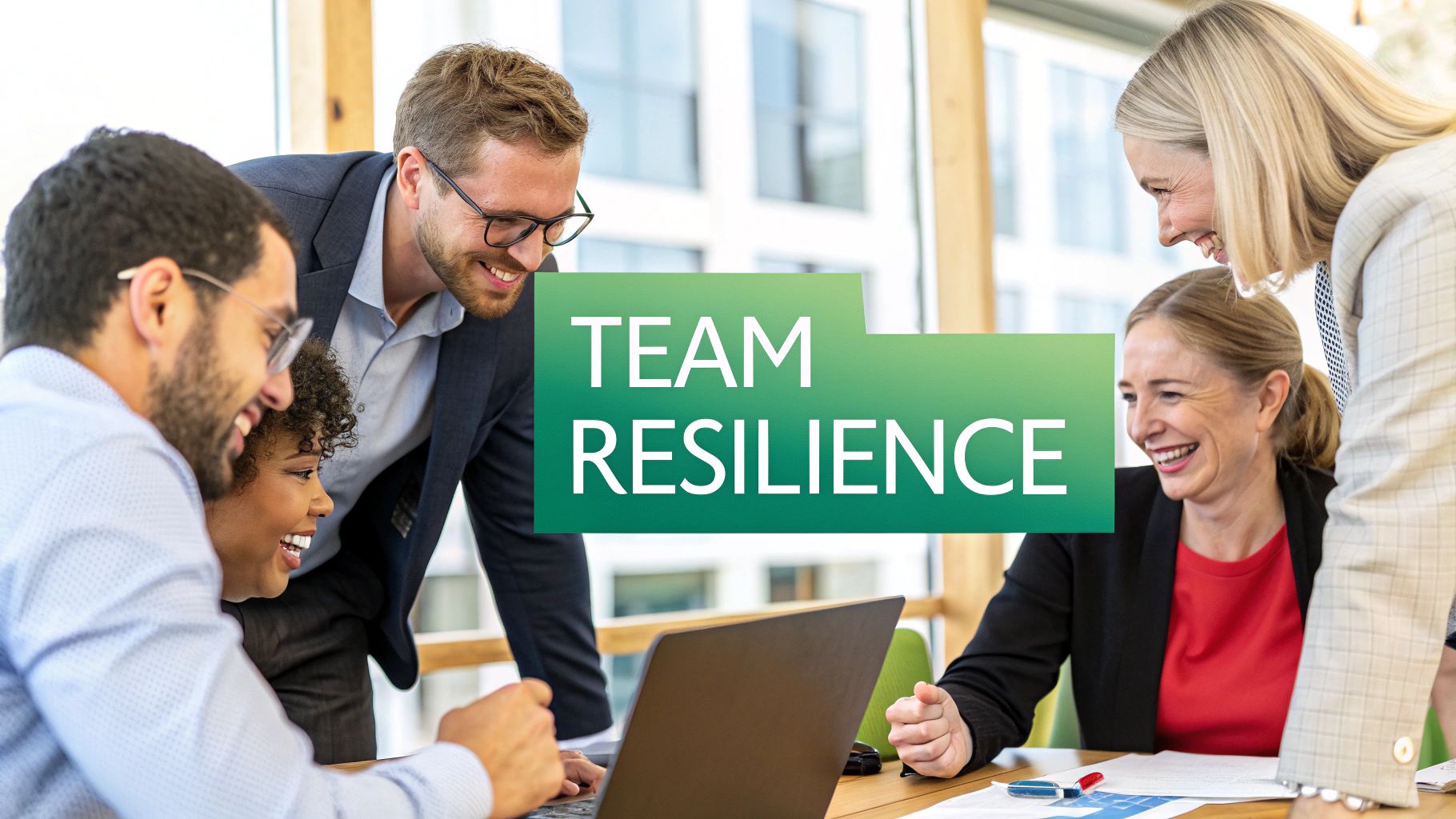What Is a Cofounder: Beyond the Basic Definition

A cofounder is more than just a business partner. They are a collaborator, a confidant, and a co-architect of a shared vision. This goes beyond simply splitting responsibilities. Cofounders are integral to the initial idea and development of a startup. They share both the triumphs and the tribulations of building something from nothing.
This foundational role sets cofounders apart from employees or advisors who join later, regardless of their seniority. Their early involvement shapes the very core of the company’s identity.
The Shared DNA of a Startup
Cofounders are essential to the startup world. A staggering 65% of the most successful brands were started by cofounders. This statistic highlights the importance of teamwork in business. You can find more detailed statistics on startup success at Luisazhou.com.
Collaboration allows founders to access a broader spectrum of skills and perspectives. This diversity is invaluable, especially when navigating the complexities of a company's early stages.
The shared journey of building a company creates a special bond between cofounders. They experience the exhilarating highs and the challenging lows together. This forges a relationship built on mutual respect, understanding, and trust. This strong foundation is essential for navigating the inevitable challenges that come with startup life. It strengthens their capacity to adapt, change direction, and persevere.
The Evolving Role of a Cofounder
The role of a cofounder is not fixed. It changes and adapts as the company grows. In the beginning, cofounders often wear many hats, contributing across various departments. As the team expands, their roles tend to become more specialized, allowing them to focus on their key strengths.
For example, a cofounder who initially managed both marketing and product development might eventually concentrate solely on product strategy. This shift is a natural evolution and is crucial for maintaining efficiency and maximizing impact as the company scales.
The Power of Complementary Skills
One of the biggest benefits of having a cofounder is the opportunity to combine complementary skills. This synergy allows the founding team to cover more ground and address challenges more effectively. It can dramatically accelerate a startup's progress.
For example, a technically skilled cofounder paired with a business-focused cofounder creates a powerful team. This combination can handle both product development and market strategy. A balanced skill set like this is often a major draw for investors. It lays the groundwork for long-term success by creating a dynamic team greater than the sum of its parts.
Finding Your Magic Number: How Many Cofounders?
Is there a perfect number of cofounders for startup success? The dynamics of a founding team shift with each additional member, influencing everything from decision-making to company culture. This section explores the optimal balance between diverse perspectives and streamlined operations.
The Two-to-Three Sweet Spot
Many successful startups find their footing with two or three cofounders. This size often provides a balance of skills and resources while keeping the decision-making process relatively straightforward. Research suggests the average number of cofounders in successful startups is approximately 2.09. This indicates a smaller, focused team can be a strong foundation for growth. Learn more about optimal cofounder numbers here.
Solo Founders: Challenges and Considerations
Solo founders face unique challenges. While they enjoy complete control, they also bear the full weight of responsibility. This can lead to burnout and slower progress. Additionally, investors sometimes see a solo founder as a higher risk, potentially impacting funding opportunities.
Four or More: Navigating Complexity
With four or more cofounders, the benefits of varied expertise can be offset by increased complexity in decision-making. Communication overhead grows, consensus becomes harder to achieve, and the potential for conflict increases. However, if roles are clearly defined and communication is prioritized, larger founding teams can thrive.
Tailoring Your Team to Your Vision
The ideal number of cofounders depends on various factors, including your business model, industry, and personal working style. A complex tech startup might benefit from a larger team with specialized skills. A simpler, service-based business might thrive with just two. Consider the specific demands of your venture and choose a team size that supports efficient execution and a healthy work environment.
Balancing Perspectives and Efficiency
Ultimately, finding the right number of cofounders is about balance. A diverse team brings a broader range of perspectives and skills. However, too many voices can slow down progress. Focus on building a team that offers both valuable insights and the ability to make quick, effective decisions. This balance is essential for navigating the challenges of the startup world and achieving long-term success.
The Cofounder Match: Finding Your Business Partner

Finding the right cofounder is crucial for any startup. It's a partnership as significant as a marriage, requiring intense collaboration and shared dedication. This section explores practical strategies for identifying and vetting potential cofounders.
Where To Look For Potential Cofounders
Begin your search by exploring existing networks. Your professional contacts, former colleagues, and alumni groups can be excellent starting points. These networks often offer a foundation of shared experience and understanding.
Startup communities, incubators, and accelerators also provide valuable opportunities to connect with like-minded individuals. Online platforms like IndieMerger can also be beneficial. IndieMerger, for example, uses AI-powered matching to link verified founders with complementary skill sets.
Qualities Beyond Skills And Experience
While technical skills and relevant experience are important, shared values, a common vision, and compatible work ethics are even more critical for a successful cofounder relationship. Resilience, adaptability, and clear communication are essential for navigating the inevitable challenges of startup life. A strong foundation of mutual respect and trust is paramount for long-term success.
Testing The Waters: Trial Runs And Progressive Involvement
Before committing fully, consider a trial period. Collaborating on a small project or pilot program allows you to assess compatibility and working styles in a low-stakes setting. This practical approach can reveal potential friction points early on.
Starting with progressive involvement, gradually increasing responsibilities as trust develops, can also be highly effective. This allows the relationship to grow organically and minimizes risk.
The following table highlights essential qualities to seek in a cofounder and their relative importance across different stages of business growth:
Introducing the table below, "Essential Qualities in a Cofounder," we present the most critical qualities to consider when evaluating potential cofounders, comparing their importance across different business stages.
| Quality |
Early-Stage Importance |
Growth-Stage Importance |
Why It Matters |
| Shared Vision |
High |
High |
Ensures long-term alignment and commitment |
| Complementary Skills |
High |
Medium |
Covers essential business functions initially, becomes less critical as you hire |
| Strong Work Ethic |
High |
High |
Essential for pushing through challenges in all stages |
| Adaptability |
Medium |
High |
Pivoting and adjusting to market changes is crucial for growth |
| Resilience |
Medium |
High |
Handling setbacks and maintaining momentum is key during scale-up |
| Communication Skills |
High |
High |
Open communication fosters trust and efficient problem-solving |
| Trustworthiness |
High |
High |
Foundation of a strong and lasting partnership |
This table illustrates that while certain qualities like complementary skills may be more critical during the early stages, others like adaptability and resilience become increasingly important as the business grows. A strong foundation of shared vision, work ethic, communication, and trust remains crucial throughout.
Evaluating Alignment: Key Conversations
Open and honest communication is paramount. Discuss long-term goals, individual roles, and decision-making processes. Exploring values, vision, and work ethics ensures alignment from the start.
These conversations should also address potential conflicts and establish strategies for managing disagreements effectively. Clear communication protocols are key to navigating challenges.
Assessing Resilience: Handling Startup Challenges
The startup journey is full of obstacles. Use hypothetical scenarios or past experiences to assess a potential cofounder’s problem-solving abilities, stress management, and ability to stay focused under pressure.
This provides valuable insights into their resilience and adaptability. A cofounder who can remain calm and solution-oriented in difficult times is invaluable. This careful evaluation and thoughtful approach to finding a cofounder greatly increases the likelihood of a strong and successful partnership.
The Cofounder Effect: Measurable Impact on Success

Having a cofounder isn't just about sharing the workload. It can significantly influence a startup's overall trajectory and potential for success. This impact is evident in various key performance indicators, from securing initial funding to attracting and retaining top talent. Let's explore the tangible benefits of having a cofounder.
Funding Success and Business Sustainability
The presence of a cofounder can greatly influence investor confidence. Investors often perceive founding teams as presenting less risk compared to solo founders. This is due to the broader range of skills and increased resilience that a team offers.
This perception translates to improved access to funding and potentially more favorable terms. This is especially crucial given the inherent challenges of the startup environment. A 2023 report indicated that 95% of VC-backed startups never return cash to investors. This stark statistic highlights the importance of factors that improve a startup's odds of success. The probability of a successful exit actually increases with the number of cofounders. For more detailed statistics, check out Exploding Topics.
Time-to-Market Advantages
Cofounders, through their combined expertise and shared workload, can significantly accelerate product development and speed up market entry. This faster time-to-market offers a vital competitive advantage. It allows startups to seize early opportunities and establish market share before competitors even emerge. This speed can be a real game-changer, especially in industries undergoing rapid evolution.
Innovation Capacity and Talent Acquisition
Cofounders with complementary skills can cultivate greater innovation. They contribute diverse perspectives, leading to more creative problem-solving and adaptability to market changes.
Furthermore, a robust founding team is more appealing to prospective employees. Top talent is drawn to opportunities to collaborate with experienced and driven leaders. This makes a compelling cofounder team a powerful recruitment asset.
Complementary Skillsets and Founder Burnout Prevention
A well-rounded founding team, where cofounders possess complementary skills, can tackle a broader spectrum of business challenges. This distribution of expertise not only enhances efficiency but also reduces the risk of founder burnout.
Sharing the demanding workload and providing mutual support helps cofounders navigate the difficulties of the startup journey more effectively. This shared responsibility empowers each founder to concentrate on their strengths, contributing to a more sustainable and productive approach.
Emotional Resilience and Business Continuity
Building a startup is an emotional rollercoaster. Cofounders provide essential emotional support during tough times, strengthening resilience and promoting business continuity.
Having a partner to share both the burdens and the victories makes a significant difference when facing the inevitable ups and downs of entrepreneurship. This mutual support is vital for maintaining morale and preventing individual burnout. It reinforces the concept that a strong cofounder relationship is not solely about business; it's about shared passion and supporting each other throughout the challenging entrepreneurial journey.
Building Cofounder Agreements That Actually Work
Even the best business partnerships thrive when built on a solid foundation of clear expectations and defined boundaries. This is particularly important for cofounders. Starting a business together is a challenging journey, often filled with both excitement and stress. This section explores how to create cofounder agreements that protect not only the business itself, but also the essential working relationship between cofounders.
Key Components of a Successful Cofounder Agreement
A well-written cofounder agreement acts as a guide for the partnership, addressing potential conflicts before they become major problems. This important document should cover several key areas:
Equity Distribution: How will ownership of the company be divided? This often reflects each cofounder's initial contributions and expected future roles.
Decision-Making Authority: How will business decisions be made? Will one cofounder have the final say, or will you use a more collaborative approach?
Roles and Responsibilities: Who is in charge of what? Clearly defined roles minimize confusion and ensure everyone knows what they are accountable for.
Conflict Resolution: How will disagreements be handled? A pre-agreed process helps prevent disputes from damaging the business.
Exit Provisions: What happens if a cofounder decides to leave? This part of the agreement should cover buyouts, vesting schedules, and intellectual property rights.
These elements are vital for creating a strong foundation for your partnership, ensuring everyone is on the same page from the start.
Equity Distribution Models: Finding the Right Balance
Deciding how to split equity is a vital, and sometimes difficult, part of forming a cofounder partnership. Several models exist, each with its own set of advantages and disadvantages. Let's explore some common equity distribution models to help you find the best fit for your situation. The following table provides a comparison of different approaches:
To help illustrate the various options, here's a comparison table outlining different approaches:
| Model |
Description |
Advantages |
Disadvantages |
Best For |
| Equal Split |
Each cofounder receives the same percentage. |
Simple and fosters a sense of equality. |
May not reflect varying levels of contribution or commitment. |
Teams with similar skillsets and equal dedication. |
| Dynamic Equity |
Equity is adjusted based on ongoing contributions and performance. |
Rewards hard work and adapts to changing roles. |
Can be complex to implement and may lead to disputes if not managed transparently. |
Startups expecting significant shifts in roles and contributions over time. |
| Vested Equity |
Equity is earned over a period, often with a cliff. |
Incentivizes long-term commitment. |
Can create tension if a cofounder leaves before fully vesting. |
Situations where long-term commitment is crucial. |
As this table demonstrates, choosing the right equity split model depends on the specific details of your startup and each cofounder's contributions. Platforms like IndieMerger can help facilitate these conversations. They provide resources and guidance for founders navigating these complex decisions.
Governance and Communication: Maintaining a Healthy Partnership
Beyond equity, your cofounder agreement should establish clear governance procedures. This includes outlining how decisions will be made, who has authority in specific areas, and how information will be shared amongst the team. Regular and open communication is key.
Establishing consistent communication protocols is also crucial. This might involve weekly meetings, shared dashboards, or other methods to keep everyone informed and aligned. Open communication helps prevent misunderstandings and builds a strong, collaborative relationship.
Accountability and Performance: Ensuring Shared Success
Trust is essential in any partnership, but accountability is equally important. The cofounder agreement should outline performance expectations and establish metrics for measuring success. This encourages individual responsibility and ensures all cofounders are contributing to the shared vision.
Planning for the Unexpected: Exit Strategies
No one wants to think about a partnership ending, but it's critical to address this possibility upfront. The cofounder agreement should outline what happens if a cofounder leaves, whether for personal reasons, disagreements, or other factors. This should include details about buyouts, vesting of equity, and the handling of intellectual property. Having these details clearly defined can prevent costly legal battles and minimize disruption if a cofounder departs. By addressing these elements thoughtfully, cofounders can create a robust agreement that sets the stage for a successful, long-term partnership. This upfront investment in clarity and structure will be invaluable as your business grows and evolves.
When Cofounders Clash: Navigating Partnership Conflicts
Even the closest cofounders experience disagreements. It's simply the nature of the demanding startup environment. This section draws on real-world experiences to explore common conflict areas and offer practical solutions for navigating these challenges.
Common Sources of Cofounder Friction
Cofounder disagreements can stem from various sources. Vision misalignment is a frequent culprit. As a company grows, initial goals can shift, leading to friction if cofounders' perspectives diverge.
Differing work ethics can also create tension. Unequal contributions, or simply different approaches to work, can breed resentment and frustration.
Disagreements about key decisions, from product direction to hiring, are another common source of conflict.
Finally, evolving personal circumstances can also impact the partnership. Life priorities, family obligations, or health changes can all affect commitment levels and strain the team.
Frameworks for Addressing Conflict
Addressing conflict constructively is vital for a healthy business. Structured conversations are essential. Set aside dedicated time to discuss issues openly and honestly, focusing on solutions rather than blame.
Active listening is crucial in these discussions. Ensure each cofounder feels heard and understood.
Mediation by a neutral third party can be invaluable. A mediator can provide an objective perspective and guide cofounders toward a resolution.
Recognizing Early Warning Signs
Early detection is key. Signs of trouble can include reduced communication, passive-aggressive behavior, and avoiding important conversations. These subtle changes often indicate underlying tension. Addressing them proactively prevents escalation.
Rebuilding Trust After Conflict
Rebuilding trust after a disagreement takes time and effort. Acknowledging the conflict's impact is the first step.
Taking responsibility fosters mutual respect and understanding.
Outlining steps to prevent similar issues restores confidence in the partnership.
When Partnerships Become Unsalvageable
Sometimes, despite all efforts, a cofounder relationship is irreparable. In these cases, buyout options allow one cofounder to exit gracefully.
Seeking legal counsel is vital during this process. A lawyer can navigate the legal complexities and ensure a fair separation.
Prioritizing business continuity minimizes disruption and maintains stability.
Preventing Recurring Issues
Clear processes can prevent future conflicts. Regular check-in meetings to discuss potential challenges and reaffirm shared goals promote a proactive approach to conflict management.
Implementing feedback mechanisms allows for open communication. A well-defined decision-making process minimizes ambiguity and clarifies roles and responsibilities. By addressing potential conflicts and prioritizing healthy communication, cofounders build a stronger, more resilient partnership.
Finding the right cofounder and navigating the inevitable challenges of a startup is difficult. IndieMerger offers a platform to connect with verified founders, fostering successful partnerships built on shared vision and complementary skills. Streamline your cofounder search and launch your startup with confidence. Learn more about finding your perfect cofounder with IndieMerger.